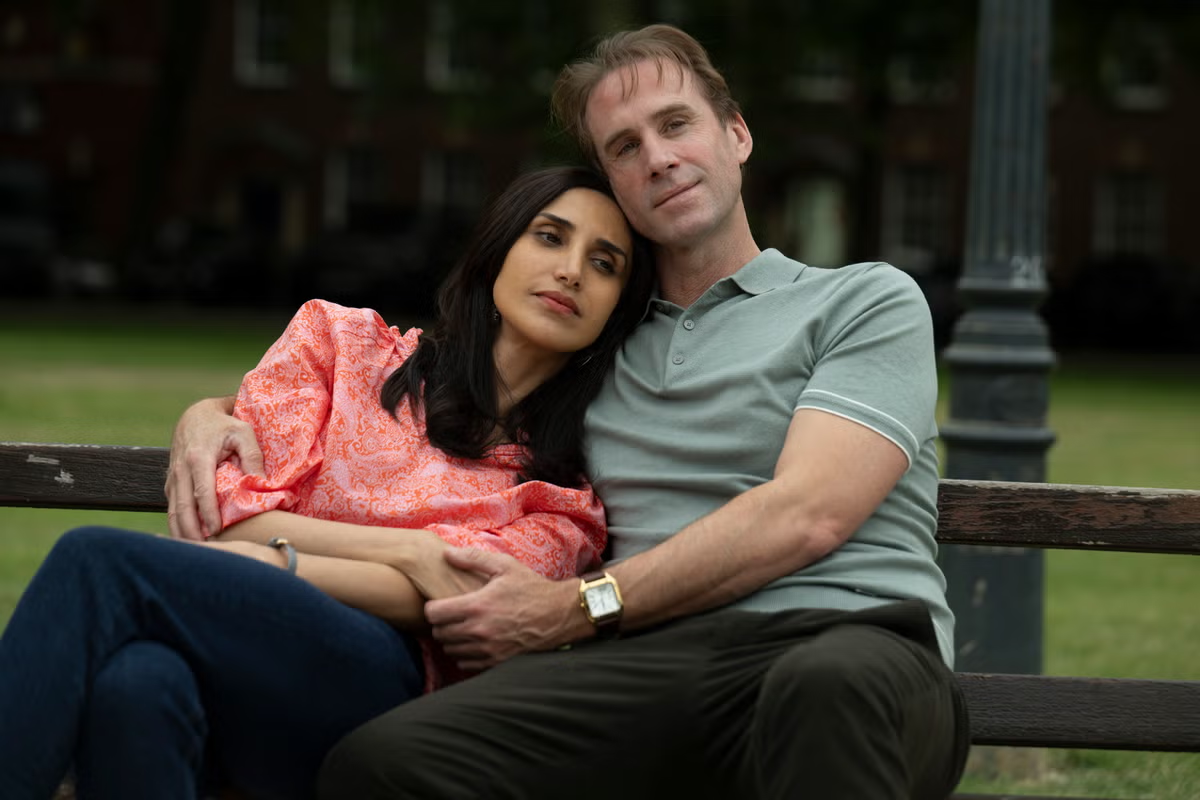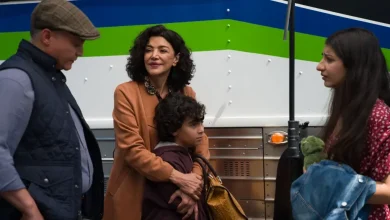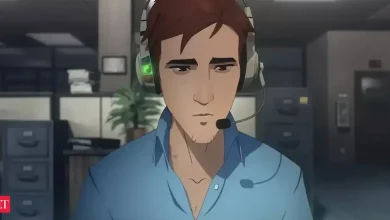Richard Ratcliffe: ‘Nazanin’s come back with her trauma, and I’ve had mine too’

“People think you’re free now you’ve come home,” says Nazanin Zaghari-Ratcliffe. “It is complicated. It’s not an easy thing. I was away for a very long time. My child was not even two when I left her. She was nearly eight when I came back.”
Nazanin is sitting, poised, in an armchair, her patterned dress flowing out beneath her. It has been three years since she was released from an Iranian jail, where she was held as a prisoner for six years on invented allegations of espionage and kept in solitary confinement for months, while her husband Richard and daughter Gabriella waited for her to come home.
Since her release in March 2022, Nazanin, 46, has settled back into family life in the north London suburb of West Hampstead. But only now is she ready to share the full traumatic tale of what happened to her in Iran and what has happened since returning home; talking in detail for the first time in a forthcoming BBC Two documentary, Prisoner 951: The Hostages’ Story, which follows a four-part drama series based on her ordeal, the latter of which begins on BBC One on 23 November at 9pm, also streaming on iPlayer. The title comes from her prisoner number. The documentary will be broadcast on BBC Two on 3 December.
“I think I underestimated how long it takes to recover and to feel comfortable talking about the early days in particular,” she says, her voice on camera calm but quiet. “I can’t claim that I am completely back to normal.”
It was in 2016 when Nazanin – a dual British-Iranian citizen – visited her parents in Tehran for a two-week holiday with her then 22-month-old daughter Gabriella. On her way home to London, she was arrested at the airport. Gabriella was collected by her maternal grandparents and remained in their care in Tehran. Her husband Richard, an accountant waiting at home for his wife and daughter, at first assumed it was an error that would be quickly resolved. It wasn’t.
It became an unfolding horror story in which Nazanin, a project manager for the charity Thomson Reuters Foundation, was sentenced to five years in prison for plotting to overthrow the government in Tehran. After global outrage at her unjustified and inhumane imprisonment, her situation became even worse the year after her arrest, when Boris Johnson, then foreign secretary, incorrectly stated in parliament that Nazanin was teaching journalism in Iran.
open image in gallery
Nazanin (Rashidi) was sentenced to five years, later increased to six, on invented charges (BBC/Dancing Ledge)
This resulted in Nazanin being dragged to court the next day on new charges that cited Johnson’s claims as proof that she was “spreading propaganda against the system”, and she was sentenced to an additional year. There was no evidence for any of the claims, and it would be six years before she was finally reunited with her husband and her daughter.
While Richard relentlessly campaigned for his wife’s freedom, journalists like myself covered the torment of her and her family’s ordeal. For the first three years of Nazanin’s imprisonment, Gabriella lived in Tehran with her grandparents. Being in an open prison for part of her sentence meant Nazanin could do activities with Gabriella, like colouring or playing, and could even cook pancakes for her – which became a crucial lifeline for them. I remember, at the time, Richard telling me how he kept looking at photos of Gabriella, unable to comprehend that his “baby was gone” too.
With each milestone – be it Father’s Day without his daughter, a wedding anniversary without his wife, or yet another Christmas alone – Richard was forced to confront the heartbreaking reality that his family had been torn apart. As the months turned into years, false hopes kept turning into crushing disappointments, and Richard dedicated his time to trying to secure Nazanin’s release with the #FreeNazanin campaign. Piles of paperwork took over the kitchen that had once been the scene of the tumble of ordinary family life. He went on hunger strike twice, for a combined total of 36 days – anything to help persuade the foreign secretary to do more to bring his wife back.
While the UK government agreed there was no question of Nazanin being a spy, they still would not publicly accept Richard’s claims that Nazanin was a hostage, arrested by the Iranian regime to force the UK government to repay its longstanding £400m debt to Iran.
When Gabriella turned five, Nazanin and Richard decided it was finally time for her to return to her father in London to start school. The thought of losing her weekly visits with her daughter was so painful for Nazanin that she went on hunger strike for two weeks, using the only tool she had left to fight for her freedom – her life.
Gabriella came home accompanied by her Iranian uncle. For weeks, she cried every night, missing her mum, while Richard struggled to console his daughter, who was fluent in Farsi but barely spoke English. Meanwhile, Nazanin clung to every memory she had of her daughter, memorising her face and every aspect of their family home, savouring the video calls she was allowed to make, longing for the day she could return to their colourful, cosy apartment. Nazanin would later say it “rips [her] heart” to see the pictures of everything she missed – from the milestones of Gabriella’s first day at school to the everyday moments she had imagined, but wasn’t there for.
While it was widely acknowledged that Nazanin was a political pawn, it was only when the UK repaid the debt in March 2022 that she was finally released. Richard and Nazanin’s reunion was documented in headlines across the world, with everyone from MP Tulip Siddiq to actress Emma Thompson celebrating. But for Nazanin, Gabriella and Richard, a new kind of ordeal was just beginning.
open image in gallery
Nazanin (Rashidi, right) is depicted during a visit from her daughter during her time in prison in Tehran (BBC/Dancing Ledge)
“Nazanin coming home was about getting back to our normal life,” explains Richard, who is now 50. “I was desperate to get back to normal – playing with Gabriella in the park on the swings. I wanted to pick up where we left off. But obviously, you don’t get to do that. Time has passed, and that path we were on as a normal family has gone. We got put on a different path. We’re rebuilding ourselves as a normal family now.”
Outwardly, the life of the Zaghari-Ratcliffes looks remarkably similar to any of their neighbours: fun days out with their daughter, coffees with friends on their north London high street, and the usual juggle of school pick-ups and work. But while they live in the same home, they’ve had to navigate the fact that their lives are irrevocably altered.
“Nazanin’s come back with her trauma, and I’ve had mine,” says Richard simply. “There are scars that will take a while to heal. We’ve needed to find a new normal, and for me to come out of battle mode, which I hadn’t even realised I was in, until she came home. We’re on a journey of laying the past to rest and building a new future. It’s a work in progress.”
It was only once Nazanin returned to their home and saw the campaigning memorabilia scattered around the flat, Gabriella’s artwork, and Richard’s decoration attempts, that she was truly confronted by just how much time had passed.
“Those changes in the flat were manifestations of the loss of time that she struggled with,” says Richard quietly. “There was a need for her to reorganise and make the flat feel like home again. We all had a reality check of how much time had passed. Nazanin grieved the loss of time with her daughter. You have to process what was lost before you can embrace the second chance and what lies ahead.”
He is aware that their experiences of those years were completely different. While his life was expanding through his campaigning, Nazanin had been stuck in a prison cell or under house arrest.
“Those of us who haven’t been to prison can’t understand what that’s like,” he says. “There are still new hostage cases all the time. It’s triggering for me because it doesn’t feel like the government learnt a lesson from our case.”
Since 2010, at least 66 foreign and dual nationals have been arrested in Iran, while a 2023 parliamentary inquiry found the British government was routinely failing citizens held hostage or arbitrarily detained in foreign states. Yet, the majority of the central recommendations from the inquiry – such as stronger media engagement and the creation of the role of a director for arbitrary and complex detentions – were rejected by the Foreign Office.
Jeremy Hunt, the former foreign secretary, openly admitted that Iranian officials made it very clear that Nazanin was taken because of the debt owed. “We knew Iran was sponsoring terrorism in the Middle East; for that reason, we’d dragged our feet paying it back. But the truth is, we should have paid that amount back a long time ago. It’s unacceptable that they took an innocent person and turned them into a pawn in a game of diplomatic leverage,” he tells the documentary filmmakers.
Richard hopes that by sharing their story, this will change. “We have a problem in the UK with how the British government protects British citizens when they’re taken hostage. Our story is a sobering reality check: a mum and baby taken for an old debt that both sides know about.
open image in gallery
Behind the scenes of the BBC drama (BBC/Dancing Ledge)
“But the UK only negotiated after Nazanin’s second conviction, once they’d exhausted their policy of just waiting it out. We only got our happy ending because a lot of people cared, and that kept the government on it. Not everyone has that level of public support.”
The ordeal of those years is still being worked through. They are currently planning a big family Christmas at Richard’s parents’ house in Hampshire – a stark difference to the six Christmases Richard spent without Nazanin. Every year, when I interviewed him, he hoped this would be the Christmas when they would finally be back together.
“The first year was so fresh, but as the years went on, I couldn’t believe we were still there,” says Richard. “In the last three years, it’s been very important for Gabriella that her mum understands how big a deal Christmas is. Nazanin came back a bit puritanical because it’s so hard to get anything into prison, so she was a bit overwhelmed by the materialism of Christmas and her daughter. She’s more into it now, but it’s still baby steps.”
And there are other changes to their lives too, like speaking in parliament, being invited to the Royal Box at Wimbledon, and regularly meeting other former hostages – something Richard calls “being part of a family we really didn’t want to join”.
For Nazanin, though, the most important part of being home is the daily freedom of being able to be a mum, a wife and a woman without restrictions. “The meaning of freedom has changed completely,” she says in the film. “To be able to pick your child up from school, brush their hair – very, very simple things – that is freedom to me. And it’s just wonderful.”
Dramatisation ‘Prisoner 951’ is on BBC One on 23 November at 9pm. The accompanying documentary ‘Prisoner 951: The Hostages’ Story’ airs on 3 December on BBC Two and both will be available to stream via BBC iPlayer





